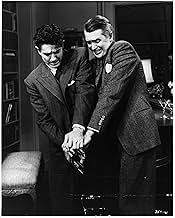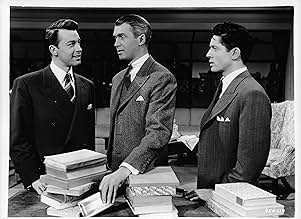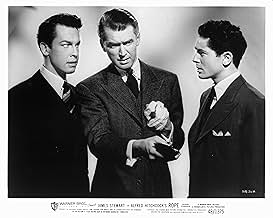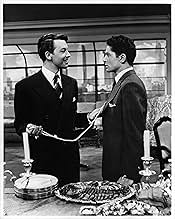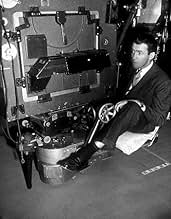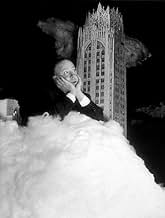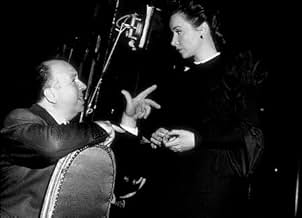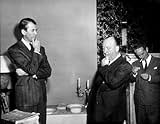Zwei Männer versuchen zu beweisen, dass sie das perfekte Verbrechen begangen haben, indem sie eine Dinnerparty veranstalteten, nachdem sie ihren ehemaligen Klassenkameraden zu Tode gewürgt h... Alles lesenZwei Männer versuchen zu beweisen, dass sie das perfekte Verbrechen begangen haben, indem sie eine Dinnerparty veranstalteten, nachdem sie ihren ehemaligen Klassenkameraden zu Tode gewürgt hatten.Zwei Männer versuchen zu beweisen, dass sie das perfekte Verbrechen begangen haben, indem sie eine Dinnerparty veranstalteten, nachdem sie ihren ehemaligen Klassenkameraden zu Tode gewürgt hatten.
- Auszeichnungen
- 4 Gewinne & 3 Nominierungen insgesamt
Cedric Hardwicke
- Mr. Kentley
- (as Sir Cedric Hardwicke)
Alfred Hitchcock
- Man Walking in Street After Opening Credits
- (Nicht genannt)
Peggy Robertson
- Woman Walking on Sidewalk
- (Nicht genannt)
Empfohlene Bewertungen
'Rope', as many reviews here point out, is shot in a "real time" format. The movie lasts 80 minutes and takes place over a period of 80 minutes - with 10 8 minute takes spliced together smartly (such as switching when focused on a back) to give the appearance of one long take. Even current "real time" dramas such as "Nick of Time" or "24" use cuts - and perhaps justifiably.
"Rope" is about two college students - the slimy Brendon Shaw (John Dall) and his friend and sub-texted-gay-partner Phillip Morgan (Farley Granger) who murder an old college mate and then, minutes after, host a dinner party to prove their calm, intellectual superiority and their "right" to kill off the lower echelons of society - they believe they are exempt from common morality. Central to this is their smug desire to show off their theory to their old mentor, Rupert Cadell (James Stewart), who is attending the party, and to get him to agree with their theories.
As the movie is essentially confined to one room, and one take, there's a definite "play" feel to the movie. While this worked wonderful with "12 Angry Men", the script and character interaction isn't quite smart enough here to sustain it. There's a lot of pontificating by Shaw, and some fine retorts by Cadell but there's a sense of forcedness about it at the same time. Only 3 of the characters are drawn with enough conviction, and it is only Cadell who we can really admire (Granger's Morgan seems to be too much of a nervous twitching type to add much to the movie). The script does allow us to gape with incredulity at the Nietzsche-esque theories of the "superman" espoused by Shaw, and the gay subtext is amusingly, and cleverly, done but there's an inevitability about the whole story - we know what will happen, it does, and this creates an ultimate lack of tension (when compared to, for example, Hitchock's "Vertigo").
The direction is, as would be expected, smart and - naturally - innovative here. The camera drifts about from character to character, as Hitchock tries his "one cut" approach, and there's some nice background detail (such as Hitchcock's flashing neon signs) to show the passage of time/current theme. Overall "Rope" is well worth seeing - it's not quite a failed experiment, nor a successful one. It's a "curio" which is worth appreciating for realizing why it was never really emulated since.
"Rope" is about two college students - the slimy Brendon Shaw (John Dall) and his friend and sub-texted-gay-partner Phillip Morgan (Farley Granger) who murder an old college mate and then, minutes after, host a dinner party to prove their calm, intellectual superiority and their "right" to kill off the lower echelons of society - they believe they are exempt from common morality. Central to this is their smug desire to show off their theory to their old mentor, Rupert Cadell (James Stewart), who is attending the party, and to get him to agree with their theories.
As the movie is essentially confined to one room, and one take, there's a definite "play" feel to the movie. While this worked wonderful with "12 Angry Men", the script and character interaction isn't quite smart enough here to sustain it. There's a lot of pontificating by Shaw, and some fine retorts by Cadell but there's a sense of forcedness about it at the same time. Only 3 of the characters are drawn with enough conviction, and it is only Cadell who we can really admire (Granger's Morgan seems to be too much of a nervous twitching type to add much to the movie). The script does allow us to gape with incredulity at the Nietzsche-esque theories of the "superman" espoused by Shaw, and the gay subtext is amusingly, and cleverly, done but there's an inevitability about the whole story - we know what will happen, it does, and this creates an ultimate lack of tension (when compared to, for example, Hitchock's "Vertigo").
The direction is, as would be expected, smart and - naturally - innovative here. The camera drifts about from character to character, as Hitchock tries his "one cut" approach, and there's some nice background detail (such as Hitchcock's flashing neon signs) to show the passage of time/current theme. Overall "Rope" is well worth seeing - it's not quite a failed experiment, nor a successful one. It's a "curio" which is worth appreciating for realizing why it was never really emulated since.
Rope is one of the finer films that Hitchcock made. Philosophy, sociology and psychology are contained in equal parts. The plot is simple, the characters are complex and Hitchcock's treatment of the Leopold and Loeb parallel quite deft. The final soliloquy from Jimmy Stewart's character, Rupert, is not only one of the finest examples of Stewart's acting abilities but also of film-making.
On the subject of filmmaking - Hitchcock filmed this in as much of a single take as possible. I believe there are only five edits in the whole thing. I can wholeheartedly tell you that it was no gimmick on Hitchcock's part. The play's plot requires that a certain amount of tension be maintained. Tracking shots are used for this purpose and quite well in my opinion. Timing, position and prop movements alone are to force us to stand in awe of a logistical challenge. All the actors are played superbly. The dialogue is natural and flowing. The finest bit of timing involves a swinging kitchen door, the rope, and the fear of discovery.
In short, this is a fine film that cannot disappoint. Highly recommended and will be well worth your time.
On the subject of filmmaking - Hitchcock filmed this in as much of a single take as possible. I believe there are only five edits in the whole thing. I can wholeheartedly tell you that it was no gimmick on Hitchcock's part. The play's plot requires that a certain amount of tension be maintained. Tracking shots are used for this purpose and quite well in my opinion. Timing, position and prop movements alone are to force us to stand in awe of a logistical challenge. All the actors are played superbly. The dialogue is natural and flowing. The finest bit of timing involves a swinging kitchen door, the rope, and the fear of discovery.
In short, this is a fine film that cannot disappoint. Highly recommended and will be well worth your time.
This 1948 Hitchcock film is mostly noted for its technical achievements. Hitchcock filmed this story, about two well-to-do rich kids who decide to commit a murder for the fun of it, as a play. Which, it in fact, originally was, though based in London and not New York. Technical limitations did not enable his original vision of making the entire picture one continuous long shot. Instead it is made up of several 8 minute continuous shots. This was the length of film that fit into one reel. Using some very inventive cutting techniques the film appears as if it was filmed all in one take. This is more impressive when you see the actual size that color film cameras were during this time period. They were absolutely enormous, bigger than a man standing. To move the camera in and around the small stage space, many of the set pieces were set on casters and rolled about to keep out of the way of the camera. Some of the actors were noted in saying that they worried every time they sat down, that there might not be a chair for them to fall into. Another achievement of the film is in terms of lighting. The apartment that the entire film is set in has several large windows overlooking the city. As the movie is more or less uninterrupted from start to finish we see the lighting change as the sun begins to set and night falls. It is a testament to this achievement that upon first viewing you don't really notice the effect. Yet, the filmmakers took great pains to get it to look realistic, staging numerous re-shoots for the final few scenes.
Though the technical achievements are quite wonderful, it is a shame that they have overshadowed what it really a very good bit of suspense. It seems the two high society murderers have planned a dinner party just after the murder. They store the corpse in a wood box that is featured prominently in the midst of the dinner. This creates an excellent mix of suspense and the macabre. Throughout the party the murderers become more unraveled even as they are enjoying their little game.
All of the acting is quite good. The two murderer (John Dall and Farley Granger) do a fine job of playing intellectual, society playboys, with a desire for excitement. It is slightly annoying watching their excited, nervous mannerisms (especially some stuttering by Jon Dall) but it is fitting with the characters. Their former instructor, Rupert Cadell, is played magnificently by the impeccable James Stewart. This is a bit of departure from Stewarts typical roles. Here he is a tough, cynical intellectual. This was his first of four collaborations between Stewart and Hitchock and it is hard to imagine his role as Scottie in Vertigo without having first played in this movie.
The story unravels in typical Hitchock fashion. The suspense is built, then lessoned by some well timed comedy, and then built again to a final crescendo. Hitchcock was excellent as a technical director and allowed his actors the breathing room they needed for fine performances. In the end I left the picture feeling more excited about the superb storytelling than any particular technical achievement. It is a testament to his craft, that Hitchock allows you to leave a picture being enamored with his story over his technical achievements. Some of the greatest effects are those you don't notice because they seem so natural and real.
Alfred Hitchock manages a triumph of technical brilliance and suspense in Rope. It's influence in the technical realm of cinema far outshines any effect the story has on future movies. This is a shame, for the story being told is one of suspense, macabre and excitement.
Like this review? Go to www.midnitcafe.blogspot for more.
Though the technical achievements are quite wonderful, it is a shame that they have overshadowed what it really a very good bit of suspense. It seems the two high society murderers have planned a dinner party just after the murder. They store the corpse in a wood box that is featured prominently in the midst of the dinner. This creates an excellent mix of suspense and the macabre. Throughout the party the murderers become more unraveled even as they are enjoying their little game.
All of the acting is quite good. The two murderer (John Dall and Farley Granger) do a fine job of playing intellectual, society playboys, with a desire for excitement. It is slightly annoying watching their excited, nervous mannerisms (especially some stuttering by Jon Dall) but it is fitting with the characters. Their former instructor, Rupert Cadell, is played magnificently by the impeccable James Stewart. This is a bit of departure from Stewarts typical roles. Here he is a tough, cynical intellectual. This was his first of four collaborations between Stewart and Hitchock and it is hard to imagine his role as Scottie in Vertigo without having first played in this movie.
The story unravels in typical Hitchock fashion. The suspense is built, then lessoned by some well timed comedy, and then built again to a final crescendo. Hitchcock was excellent as a technical director and allowed his actors the breathing room they needed for fine performances. In the end I left the picture feeling more excited about the superb storytelling than any particular technical achievement. It is a testament to his craft, that Hitchock allows you to leave a picture being enamored with his story over his technical achievements. Some of the greatest effects are those you don't notice because they seem so natural and real.
Alfred Hitchock manages a triumph of technical brilliance and suspense in Rope. It's influence in the technical realm of cinema far outshines any effect the story has on future movies. This is a shame, for the story being told is one of suspense, macabre and excitement.
Like this review? Go to www.midnitcafe.blogspot for more.
What an unusual Hitchcock film... such a small cast, and the whole film consists of long takes. Before seeing this, I had heard enormously positive things about it... most of them coming from my father, who hadn't seen it for about fifteen years. I had high expectations for the film, but I must say it exceeded them. Though there are only a few cuts in this film, meaning the camera is running almost non-stop, Hitchcock makes great use of it; he manages to fit in many of his trademark angles and closeups in, without it seeming forced. At one point, the camera focuses for a minute and a half on an inanimate object with only one visible character moving back and forth near it, and he manages to drench the cut in suspense, leaving even the most calm and collected of viewers at the edge of their seat, biting their nails. Only the fewest directors could make that sequence work, and luckily Hitchcock is one of them. The plot is great. It's interesting and it develops nicely. The pacing is perfect. I was never bored for a second. The acting, oh the acting... John Dall is excellent as Brandon, the intellectually superior and very smug main character. Makes me wonder why he didn't get more roles in his career. Stewart is great, as usual. The rest of the acting is very good as well. The characters are well-written and credible. For such an unusual film, and despite the heavy feeling of watching a stage play rather than a film, it's very entertaining and effective. If for nothing else, watch this to enjoy Dall as the cold, calculating and manipulative psychopath. I recommend this to fans of Hitchcock and Stewart. 8/10
You know the quote about Actors being cattle. Hitchcock corrected saying he never said that actors were cattle what he said was that actors "should be treated" like cattle. Great actors give perfect performances in Hitchcok films. Think of Grant and Bergman in Notorious, Cotten in Shadow Of A Doubt not to mention Anthony Perkins in Psycho. Often the improbabilities of the plot become totally credible by the credibility of the performances. Here, John Dall and Farley Granger act and act to outrageously that it's impossible to believe they can get away with it for more than five minutes. Their characters are impossible to warm up to like it happened with Anthony Perkins in Psycho or with Colin Firth in Apartment Zero, no matter how sickly those characters are you can't help connect with their humanity. Hitchcock in Rope seemed much more taken by the technical wizardry and it is unquestionably fun to watch. So Rope provided me with superficial pleasures and sometimes that's enough.
Wusstest du schon
- WissenswertesSince the filming times were so long, everybody on the set tried their best to avoid any mistakes. At one point in the movie, during the first take scene, the camera dolly accidentally ran over and broke a cameraman's foot, but to keep filming, he was gagged and dragged off the soundstage. Another time, a woman puts her glass down but misses the table. A stagehand had to rush up and catch it before the glass hit the ground. Both parts are used in the final cut.
- PatzerWhen Phillip and Brandon put David in the chest, the rope is clearly around David's neck and completely inside the box. But in a few minutes Phillip finds the rope hanging, very far, outside the box.
- Zitate
Mrs. Atwater: Do you know, when I was a girl I used to read quite a bit.
Brandon: We all do strange things in our childhood.
- Crazy CreditsThe closing credits list the victim David Kentley first, and the rest of the cast as credited with a phrase describing their relation to him ("His friends - Brandon, Phillip", "David's girl - Janet", etc) and use only a first/last name.
Rupert Cadell is listed last, and with his full name and without any phrase of relation.
- VerbindungenFeatured in Great Performances: James Stewart: A Wonderful Life (1987)
Top-Auswahl
Melde dich zum Bewerten an und greife auf die Watchlist für personalisierte Empfehlungen zu.
Details
- Erscheinungsdatum
- Herkunftsland
- Sprache
- Auch bekannt als
- La soga
- Drehorte
- Warner Brothers Burbank Studios - 4000 Warner Boulevard, Burbank, Kalifornien, USA(Brandon´s penthouse)
- Produktionsfirmen
- Weitere beteiligte Unternehmen bei IMDbPro anzeigen
Box Office
- Budget
- 1.500.000 $ (geschätzt)
- Weltweiter Bruttoertrag
- 11.580 $
- Laufzeit1 Stunde 20 Minuten
- Farbe
- Seitenverhältnis
- 1.37 : 1
Zu dieser Seite beitragen
Bearbeitung vorschlagen oder fehlenden Inhalt hinzufügen

Oberste Lücke
What is the streaming release date of Cocktail für eine Leiche (1948) in Brazil?
Antwort


